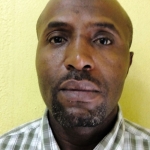Where attacks have no name
Kano, Nigeria, December 9 -- The familiar call came just a few hours after television channels in Nigeria showed the solemn memorial service in France for the 130 victims of last month’s Paris attacks.
Another suicide bomb strike. Several people had been killed in a blast targeting the annual Shiite Muslim Ashura festival procession outside Kano, in northern Nigeria, where I live.
I drove to the scene, some 20 kilometres (13 miles) outside the city. By the time I arrived, the bodies of the 21 people who died and the dozens more injured had been taken away. The only signs of what had taken place were the bloodstains and flesh on the road.
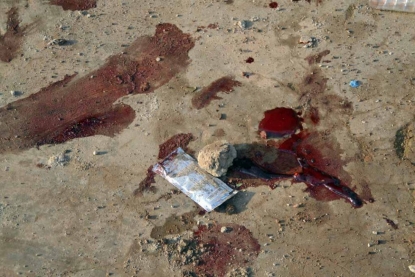 Blood stains on the ground after twin bomb blasts killed at least 15 people in Abuja. October, 2015. (AFP / stringer)
Blood stains on the ground after twin bomb blasts killed at least 15 people in Abuja. October, 2015. (AFP / stringer)I've covered almost all the Boko Haram attacks since the insurgency began six years ago. The worst was the six days of fighting in June 2009 that's considered the start of the violence.
Maiduguri, the capital of Borno state in the northeast, was literally a battleground, with the military and the armed insurgents locked in deadly gun battles.
Rattles of gunfire and the deafening sound of explosives shook the city. By the time the guns fell silent, some 800 people had been killed.
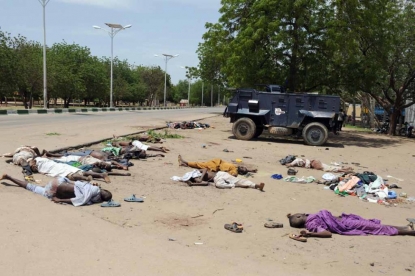 Bodies of suspected Boko Haram members lie on the road in Maiduguri after clashes with security forces. July, 2009. (AFP / Pius Utomi Ekpei)
Bodies of suspected Boko Haram members lie on the road in Maiduguri after clashes with security forces. July, 2009. (AFP / Pius Utomi Ekpei)Mohammed Yusuf, the group's leader, was among the dead.
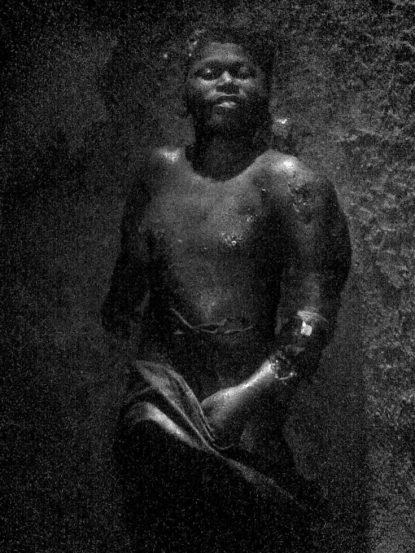 The body of then Boko Haram chief Mohammed Yusuf after he was killed by police. August, 2009. (AFP / Aminu Abubakar)
The body of then Boko Haram chief Mohammed Yusuf after he was killed by police. August, 2009. (AFP / Aminu Abubakar)I was traumatised by what I'd seen for weeks. Even today, the images are vivid: I saw arrested Boko Haram suspects on their knees being shot dead at close range by enraged policemen outside the police headquarters. Trucks offloaded piles of bullet-riddled bodies of suspected Boko Haram fighters.
The forgotten victims of the Kano attack
The broadcast in Nigeria of the Paris memorial service came just a day before the first anniversary of a similar attack in Kano, in which at least 120 people were killed and hundreds more injured.
Then, gunmen also opened fire with assault rifles on an unsuspecting public – the Muslim faithful who had just begun their Friday prayers at a mosque. Suicide bombers then blew themselves up among the fleeing crowds.
Like in Paris, where the Islamic State group claimed responsibility, Boko Haram -- its now affiliate -- said it carried out the attack.
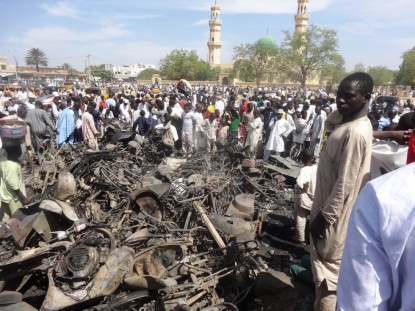 Residents outside the central mosque in Kano a day after gunfire and suicide blasts killed at least 120 people there. (AFP / Aminu Abubakar)
Residents outside the central mosque in Kano a day after gunfire and suicide blasts killed at least 120 people there. (AFP / Aminu Abubakar)But unlike in Paris, the names and photographs of the victims haven't been published in newspapers or broadcast around the world. The date of the attack hasn't been seared into the national consciousness.
In fact, 12 months on, we're still not exactly sure how many lost their lives.
On the eve of the anniversary, as television showed the French memorial, it was business as usual in Kano, apart from prayers for peace at mosques across the city. The president didn't visit, there were no cabinet ministers, military or first responders from the scene standing with their heads bowed as the national anthem played.
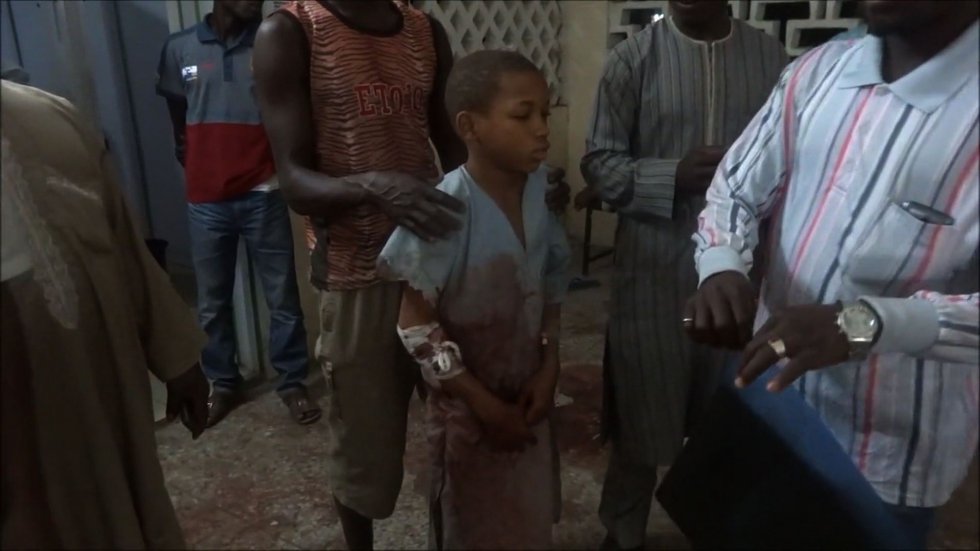
Click here to watch on a mobile device
Death a part of life – 17,000 estimated to have been killed
It's not that no one cares in Kano. Of course they do. It's just that after living with violence for so long, our attitude to death is different.
Northern Nigeria is predominantly Muslim and the culture is in many ways influenced by Islam.
We have a kind of fatalistic belief about life, that whatever happens is decreed by God. Even if you're killed, it's seen as it was meant to be. In Hausa, we have a saying: "When death calls you must answer it."
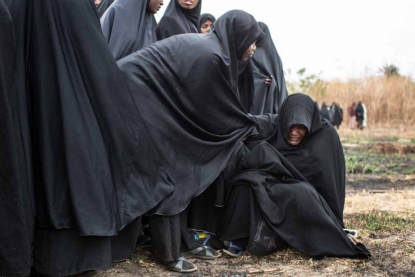 A woman cries at a funeral of a young student killed after soldiers shot into a crowd on the side of a road in Kaduna. March, 2015. (AFP / Nichole Sobecki)
A woman cries at a funeral of a young student killed after soldiers shot into a crowd on the side of a road in Kaduna. March, 2015. (AFP / Nichole Sobecki)Death is so much more a part of life here.
You only need to look at the figures for the Boko Haram insurgency to see: since those days in Maiduguri in 2009, at least 17,000 people are estimated to have been killed and some 2.6 million made homeless by the violence.
In September, 117 people were killed in Maiduguri but it barely registered in terms of international news coverage.
On November 18, two young girls - one said to be as young as 11 - blew up at a mobile phone market in Kano, killing 15.
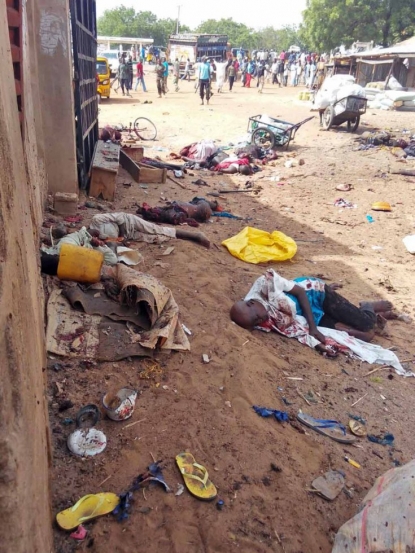 Victims of a suicide bomb attack that killed at least 14 people at a market in the northeastern town of Damaturu, July, 2015. (AFP / Aminu Abubakar)
Victims of a suicide bomb attack that killed at least 14 people at a market in the northeastern town of Damaturu, July, 2015. (AFP / Aminu Abubakar)When a bomb went off in the Adamawa state capital, Yola, the day before that, killing at least 34, Facebook activated its "Safety Check" feature in Nigeria for the first time.
I'm sure that was welcomed by those who have Internet access in the city, but there was definitely a sense of -- why now when there's been multiple attacks, sometimes every day for years now?
Violence has become so frequent that people have become accustomed to it.
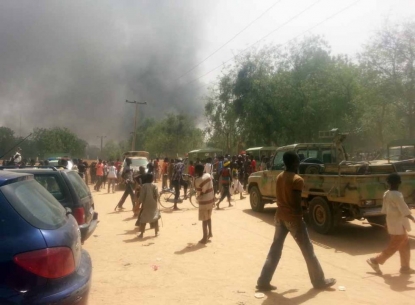 People watch smoke rise in Maiduguri in March, 2014, after Boko Haram fighters attacked a military base, freeing dozens of insurgents. (AFP / stringer)
People watch smoke rise in Maiduguri in March, 2014, after Boko Haram fighters attacked a military base, freeing dozens of insurgents. (AFP / stringer)As death toll rises, attitudes change
I wouldn't say there's fear in Kano. No one can say when and where the next attack will come from.
Unlike in Paris, there was more outrage than shock at the time of last year's attack.
We all know Boko Haram has attacked mosques and churches before, but the fact the central mosque was targeted caused real anger. That was unusual.
The Emir of Kano's palace is next door and he's a revered figure for Muslims in northern Nigeria.
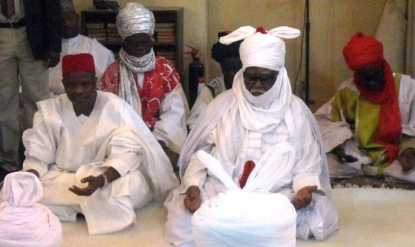 The revered emir of Kano, Ado Bayero (R) prays in a central mosque in Kano in January, 2012, after a wave of Boko Haram attacks left 160 dead. (AFP / Aminu Abubakar)
The revered emir of Kano, Ado Bayero (R) prays in a central mosque in Kano in January, 2012, after a wave of Boko Haram attacks left 160 dead. (AFP / Aminu Abubakar)It wasn't even the deadliest attack on the city. In January 2012, 185 people lost their lives in a series of attacks against the security services.
I was speaking to a friend recently and he was saying that whenever there was an explosion, people used to flee.
Now, people want to go and see what's happened. They take pictures on their cell phones and post them on social media.
People have become accustomed to the violence, desensitised even. Last year, people even pursued some of the gunmen from the mosque and killed a few of them. Before, that would have been unthinkable.
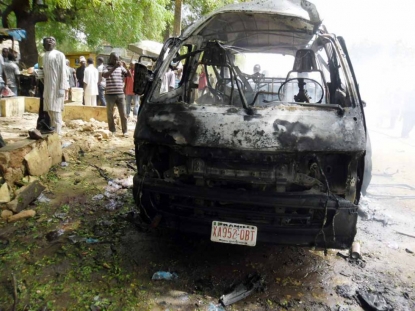 The charred carcass of a bus targetted in a suicide attack in the northeastern town of Potiskum, after twin blasts killed at least 27 people. February, 2015. (AFP / Aminu Abubakar)
The charred carcass of a bus targetted in a suicide attack in the northeastern town of Potiskum, after twin blasts killed at least 27 people. February, 2015. (AFP / Aminu Abubakar)No increased security
The attacks in Paris have seen huge numbers of troops and police on the streets. Security has been tightened, suspects' homes have been raided and details of the criminal investigation released.
That doesn't happen here. There isn't the manpower. I'm not even aware anyone's been arrested in connection with the Kano bombings.
Last year I was going to the market and saw a construction site that had become a makeshift car park, just the sort of place where there are large crowds and where explosions have occurred before.
I was scared and rang the police, saying anything could happen. They told me they were aware of it, but what could they do? There are hundreds of more places like it and they monitor them all.
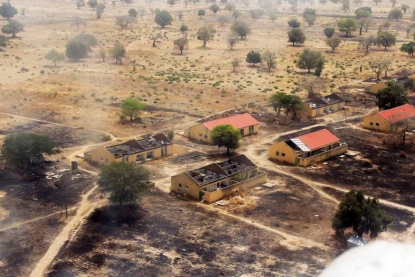 The burnt-out buildings of a school in Chibok, northeastern Nigeria, March, 2015. Boko Haram Islamists kidnapped more than 200 girls from the school in April, 2014. (AFP / Sunday Aghaeze)
The burnt-out buildings of a school in Chibok, northeastern Nigeria, March, 2015. Boko Haram Islamists kidnapped more than 200 girls from the school in April, 2014. (AFP / Sunday Aghaeze)Nevertheless, a military officer told me they're more subtle in their operations in Kano now. They try to limit the presence of armed security on the streets because Kano is a commercial city and people come from far and beyond.
If they keep the checkpoints and guns, it will scare people away and the city would die. The increased poverty and unemployment would be another problem to deal with. The military no longer publicises its raids and the arrest of suspects on a daily basis, and tries to limit the number of checkpoints to give the impression that all is well.
‘When you dig a hole, dig it shallow’
The attack on Kano last year and the litany of others have definitely galvanised a sense of a common enemy to be fought, rather than people seeing Boko Haram as Islamists who just want to create an Islamic state.
People here have been watching the Paris attacks. Most of the satellite networks carry the BBC and other channels. There's a lot of sympathy because people here understand what such attacks mean, the loss of loved ones. There's sadness that France has had this.
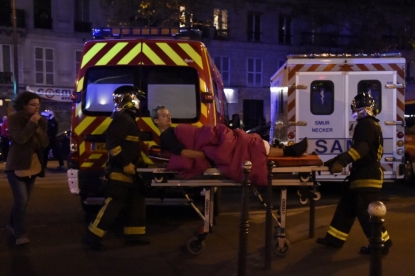 A victim of the November 13 attacks in Paris is carried on a stretcher. (AFP / Dominique Faget)
A victim of the November 13 attacks in Paris is carried on a stretcher. (AFP / Dominique Faget)But there's also a sense that France should be careful about how it executes the war in Syria.
"When you dig a hole, dig it shallow because you may end up falling in," as we say in Hausa.
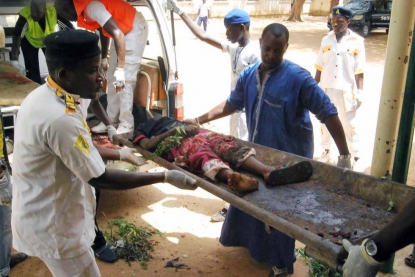 A victim of a bomb attack in northeast Nigeria is carried on a stretcher. June, 2015. (AFP / Aminu Abubakar)
A victim of a bomb attack in northeast Nigeria is carried on a stretcher. June, 2015. (AFP / Aminu Abubakar)Life has changed
Living in a place where there have been so many attacks has changed the way we live, although we try to live as normal a life as possible.
I try not to upset my family with details of my job. But a few years ago, at the height of the attacks on Kano, I did have to sit them down and explain the situation.
I told them that if anyone comes knocking on the door, they should ask who it is from behind the door. If they can’t figure out who it is, they shouldn’t open it. I've also told them never to answer any stranger looking for a house in the neighbourhood.
At the time, a number of media organisations had been threatened and the ThisDay newspaper offices had been bombed in Kaduna and Abuja. The media had become a target.
My son, who was 12 at the time, noticed the "Press" sticker on the car and told me, "Dad, I think you should take this off."
I don’t have that sticker on my car now.
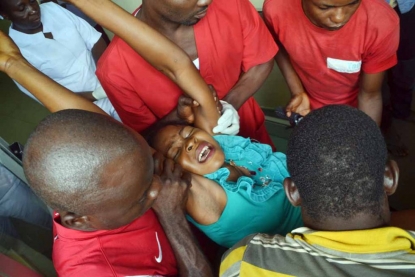 Rescuers carry a victim away from a scene of multiple explosions in Abuja, October, 2015. (AFP / stringer)
Rescuers carry a victim away from a scene of multiple explosions in Abuja, October, 2015. (AFP / stringer)The big lesson for us, and I suppose for people in France, is not to panic because that's exactly what the attackers want, for people to lose their bearings.
That's helped in Kano. People have refused to be cowed. Once that happens, when schools are shut and people stay indoors, the attackers have won.
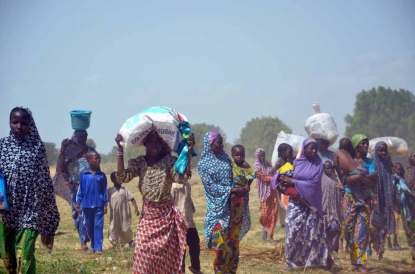 Women and children flee after Boko Haram burned down their village near Maiduguri. (AFP / stringer)
Women and children flee after Boko Haram burned down their village near Maiduguri. (AFP / stringer)I remember last year, the military in Kano issued a statement saying Boko Haram were going to attack over the Christmas period and that people should stay at home so there would be no collateral damage.
But people defied it. That's an important lesson. Don't be cowed and stand up when you can. If not, there will be more and more such attacks.
Northern Nigeria has seen similar uprisings in the past and managed to put them down. I've no doubt the Boko Haram attacks will also come to pass but before that happens, there'll be more bombings, shootings and deaths.
Aminu Abubakar is an AFP correspondent based in Kano, Nigeria.
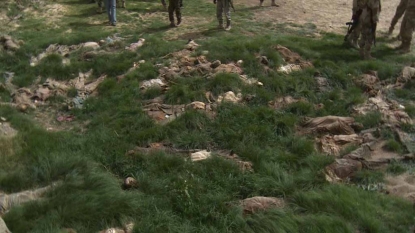 Some of the 100 bodies found in a mass grave near the city of Damasak, after it was retaken from Boko Haram in March, 2015. (AFP / Abba Ali Kaya)
Some of the 100 bodies found in a mass grave near the city of Damasak, after it was retaken from Boko Haram in March, 2015. (AFP / Abba Ali Kaya)

